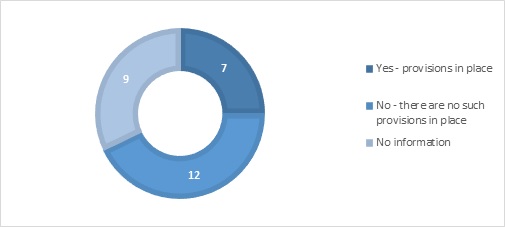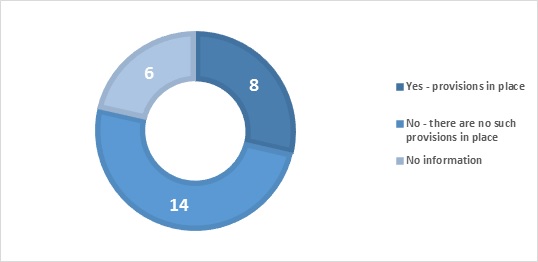Vetting of foster families and residential care personnel
Provisions requiring frequent vetting of foster families (More information on EU Member States' provisions can be found below)

Note: No information available for Bulgaria, Croatia, Denmark, Italy, Latvia, Luxembourg, Malta, Portugal and Spain.
Source: FRA, 2014
Provisions requiring frequent vetting of residential care personnel (More information on EU Member States' provisions can be found below)

Note: No information available for the Lithuania, Luxembourg, Malta, Portugal, Slovenia and Sweden.
Source: FRA, 2014
Key findings
- Vetting procedures exist in most Member States. However, they often only apply to a limited group of professionals (e.g. social workers or teachers) and do not cover all of those in direct and regular contact with children (e.g. administrative staff and assistants).
- In some Member States (e.g. Austria, Denmark, Germany, Ireland, the Netherlands, Sweden and the United Kingdom) the police and/or judicial authorities provide specific certificates for persons working with children
- Vetting provisions are often, but not always, part of accreditation and licensing procedures.
- As a minimum, vetting procedures require checking criminal records for acts of sexual abuse and sexual exploitation of children. In a few countries additional requirements include mental health and psychological reports (e.g. in Hungary, Poland and Cyprus)
- Very often the obligation for vetting professionals lies with the service providers, who must apply the existing provisions when recruiting staff. Nevertheless, state or regional and municipal authorities maintain responsibility for the implementation of existing provisions. Given the plurality of service providers, the systematic monitoring of the implementation of vetting procedures is challenging.
- Following initial checks, the frequency of reviews varies significantly, and in some Member States there are no particular provisions on frequency of reviews and monitoring.
In all Member States there are requirements for the vetting of persons that are foster parents candidates. However, in at least four Member States (Austria, Estonia, Lithuania and Slovenia) there are no particular mandatory provisions for the frequency of reviews.
EU Member States' provisions requiring frequent vetting of foster families
All Member States have requirements for the vetting of persons that are foster parents candidates upon initial selection. Provisions setting a specific timeline for the frequency of reviews were, however, only identified in seven Member States (Belgium, France, Germany, Ireland, the Netherlands, Romania and the United Kingdom).
When such provisions are in place, requirements vary significantly. In Belgium (French community) for example, reviews should take place every five years. In France and Romania, vetting is part of the licensing process of foster parents; these licenses must be renewed every five years in France and every three years in Romania. In the Netherlands and the United Kingdom, foster parents should be assessed on an annual basis and a new certificate of good conduct may be requested. In Ireland, general provisions require that the police (Garda Síochána) clearance certificates should be renewed every three to five years.
In some Member States (such as Hungary and Poland), the law establishes the frequency of reviews of the health status and the psychological suitability of foster parents, but there are no provisions requiring any checks of criminal records.
In other Member States, as in Greece for example, there are general provisions for initial requirements (including clean criminal records) to be applied throughout the placement period; there are, however, no specific provisions in place stipulating the frequency of and the procedure for reviews.
EU Member States' provisions requiring frequent vetting of residential care personnel
In eight EU Member States (Belgium (applicable to the French community), Bulgaria, Germany, Ireland, Italy, Latvia, Romania and the United Kingdom), there are specific provisions for the frequency of reviews and checks following an initial vetting. In Romania and Latvia for example, the personnel in residential facilities should be subjected to an annual vetting; in Latvia, the personnel should also be assessed annually. In Bulgaria, the assessment, including vetting, of personnel in such facilities should take place every three years.